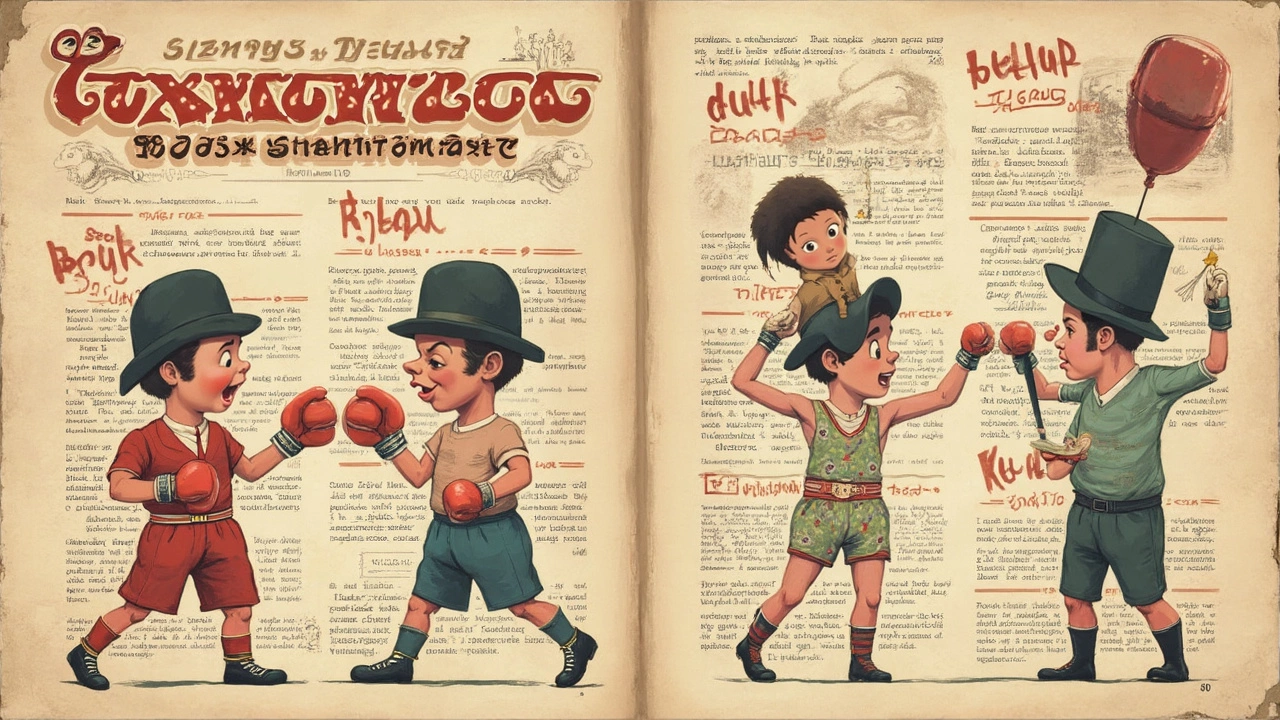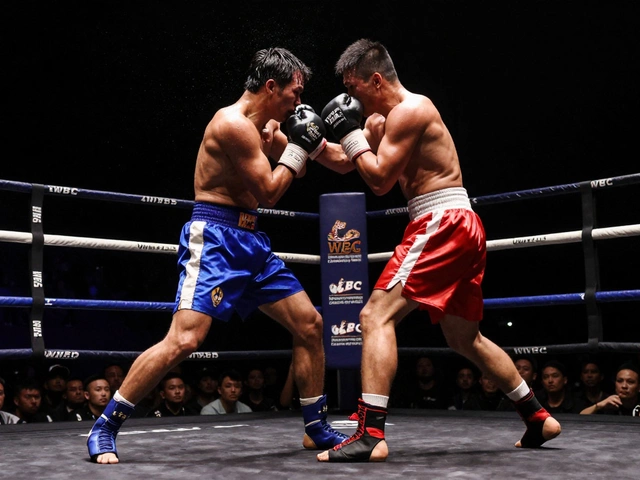People can’t resist a good punch-up, can they? Whether it’s the crowd’s roar echoing through stadiums or the tension on-screen, there’s something magnetic about two people squaring up to trade blows. But if you’ve ever tried talking about these clashes without using the phrase “boxing match” a dozen times, you might run out of words pretty fast. The English language, though, has a knack for spicing things up, especially when it comes to sports. Want to sound like you know your jab from your uppercut? Let's get stuck into the world of boxing synonyms that keep conversation fresh, lively, and a touch more colorful.
The Many Faces of a Boxing Match: Terms Old and New
Calling it a “boxing match” is honestly just the tip of the iceberg. In gyms, pubs, ringside chatter, and media, you’ll hear a heap of different terms tossed around. The most popular one has to be “fight.” Quick, direct, and everyone’s heard it. Out with your mates at the pub — “Who’s fighting tonight?” Even Finn, my own little lad, picked up “fight night” before he could tie his shoes. The term “bout” sounds a bit more official, like something you’d hear from an announcer in Las Vegas or on the undercard in Adelaide. Fans and commentators tend to use “bout” to make the match sound a bit more serious or technically precise.
Now, the moment gloves are laced for a big-money title clash – that’s a “prizefight.” This goes back ages, when the point of getting in the ring wasn’t just glory but grabbing a fat purse. Those early prizefights were often illegal, happening in fields or barns, with bets flying and police lurking. These days, “prizefight” conjures up images of pay-per-view events or classic posters of Ali and Frazier. Speaking of old-school, there’s “scrap.” It’s gritty and unrefined, and Aussie blokes use it for dust-ups in the backyard as much as a scheduled fight. “Scuffle” and “slugfest” land in the same ballpark, but “slugfest” is more reserved for those absolute wars in the ring where defense takes a backseat and both fighters just swing for the fences.
“Pugilistic contest” might pop up if you stumble across some vintage sports writing. “Pugilism” comes straight from Latin, meaning “boxer,” and it shows up in literature to add a bit of classical flair (“gentleman’s sport,” anyone?). You might see “sparring match” too, but that’s technically for practice fights. Still, plenty of people mix it up when talking about anything from friendly glove sessions to televised events. And if you’re being cheeky or writing with a wink, “donnybrook,” “dust-up,” or even just “the main event” can work.
Why So Many Synonyms? Where the Lingo Came From
The world of boxing isn’t shy about reinventing itself — and neither are the folks who write or talk about it. Most boxing vocab springs from three places: the fighters, the fans, and the journalists desperate not to repeat themselves. Early on, bare-knuckle contests were called “mills,” “set-tos,” or the formal-sounding “matches” or “engagements.” Travel back to 18th-century England and you’ll find events called “mills,” especially among the working class. These would take place in secret, dodging authorities who cracked down on gambling and prizefighting. That covert culture spiced up the slang.
“Bout” took root in the late 19th century as the sport started getting rules. Think Queensberry Rules (still used as the backbone for today’s fights) and the rise of organized clubs. Reporters covering these events needed something to distinguish an official tournament round from a wild brawl on the street. Meanwhile, “fight” is just primal English — dating back to before boxing even had gloves. The word’s roots are deep in Old English and Germanic history (if you ever studied Old Norse, their “fehta” means exactly what you think). No-nonsense, right?
Sometimes, it’s about what the fight means rather than the fight itself. “Title fight” points to championship glory, “grudge match” brings drama (think bad blood between fighters), “rematch” stirs up memories of unfinished business. In Australia, “blue” doubles as slang for a minor fight, whether in the playground or an official setting. Fancy a bit of wordplay? “Throwdown,” “showdown,” and “clash” show up in media headlines to ramp up the tension. Even UFC and MMA have borrowed boxing terms, spreading the lingo even wider.

Tips for Picking the Right Word
Here’s where you get to sound like a natural in any crowd. If you’re around fight fans, “fight” or “bout” does the trick—short and sharp. The folks actually in the gym might call it a “scrap” or “matchup,” especially when talking about the next sparring session. For event promoters, or if you’re hyping up an upcoming PPV, “showdown,” “main event,” or “title fight” sells it as can’t-miss entertainment. Commentary on highlights? Try using “slugfest” for back-and-forth brawls or “technical bout” for matches with fancy footwork and strategy. If the contest has history, call it a “grudge match” — it brings a bit of soap opera spice.
The context matters. Talking to kids, simple is better — Finn just calls everything a “fight,” and trust me, that works. Mixing it up with die-hard fans? Drop in “bout” or “prizefight” and you won’t sound out of place. Need to sound official for a newsletter, blog, or write-up? “Pugilistic contest” and “boxing engagement” have that old-school luster. Always think about clarity before anything else. Slang like “dust-up” or “blue” is cool but might confuse someone outside Australia or the UK. And if you’re chatting with international friends, stick with the universal terms. No point calling it a “donnybrook” if nobody gets the reference!
When it comes to writing or talking about boxing online, SEO is king. Use “boxing match” alongside synonyms like “fight” and “bout” to get more eyeballs—search engines scoop up articles that cover a range of ways people look for information. Journalists do it all the time: headlines shout “Blockbuster Showdown” while the first line drops “boxing match” for the algorithm. It’s a trick as old as the sport, really.
Boxing Around the World: Regional Spins and Fun Facts
Australians love a good punch-up, but they’ve given the vocabulary their own flavor. “Blue” for a fight is pure local, and you’ll hear “stoush” out bush. Head over to the States, and it’s “prizefight,” “slugfest,” or just about any headline with “showdown” or “title clash.” Brits keep it old-school—“bout,” “scrap,” and a cheeky “dust-up” for good measure. If you chat with Irish fans, don’t be shocked by “donnybrook,” which actually goes back to a fairground known for wild brawls.
Even the ring announcers put a spin on things, switching from the technical (“scheduled 12-round bout”) to the dramatic (“tonight’s main event!”). And yes, UFC and MMA events have blurred the line, taking “fight card,” “matchup,” and “undercard” straight from boxing. Want weird? In the Philippines, some say “bakbakan,” and in Spain, it’s “combate.” The lingo grows every year—new promoters, new fans, new headlines keep the words fresh.
Quick fun fact: The phrase “throw in the towel” actually started in boxing. It meant literally chucking a towel into the ring to admit defeat and stop the fight early for a boxer’s safety. You hear it in offices now for giving up, but that’s pure ring history. Even “ring” comes from the sport’s early days, when spectators formed a circle—or a “ring”—around the fighters. These days, the “ring” is squared off for practical reasons (ever tried making a business out of sixteen blokes holding hands in a circle?).
If you’re writing, chatting with mates, or even just watching a bout with Finn at your side, there are plenty of ways to keep your language fresh. Whether you stick to classic “boxing match” or mix in “fight,” “bout,” or “scrap,” you’ll sound like you know your stuff — and keep things interesting for everyone listening.








